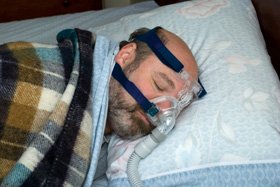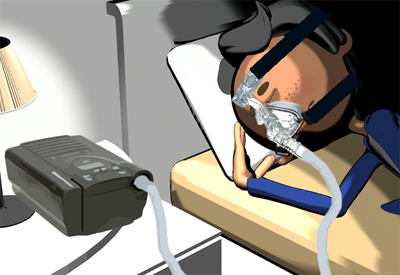Sleep Apnea Machine Guide
Machines and Devices for Sleep Apnea
Sleep apnea machine reduces daytime sleepiness and improves neuropsychiatric function in patients with sleep apnea.
If you have to treat a mild sleep disorder, you don't always need a sleep apnea machine.
Changes in daily activities may help reduce your symptoms, such as:
- sleeping on your side instead on your back.
- losing weight if you are overweight.
- avoid smoking, sleeping pills, alcohol and other medications which can make you sleepy.
For more info about alternative methods to treat sleep apnea, see alternative cures for sleep apnea.

If you have moderate or severe sleep apnea, you will need help from special devices to improve the quality of your sleep and treat the apnea disorder.
Fortunately, there are effective sleep apnea breathing machines that will improve your health, reduce your daytime sleepiness, hypertension and heart problems.
These sleep apnea machines are:
- CPAP or Continuous Positive Airway Pressure
- Mechanical Ventilators
- Bi-PAP or Bi-level Positive Airway Pressure
- APAP or Autotitrating sleep apnea machine
- Oral Appliances for positioning the jaw or tongue.
Continuous Positive Airway Pressure (CPAP)

CPAP is famous for its benefits but also for its side effects. Many CPAP users can't tolerate the machine so they choose other methods to treat sleep apnea.
Here are the basic information about CPAP that you should know:
- CPAP is the most effective sleep apnea machine for adults with sleep apnea disorder.
- CPAP treats sleep apnea by using air pressure to keep the airways from your nose and mouth more open while you sleep.
- because is extremely effective, CPAP has become the number one treatment of most sleep centers.
- possible CPAP side effects: dry nose, stomach bloating, irritation of the skin on the face, headaches.
- you must have a doctor's prescription to obtain a CPAP.
To understand the benefits of CPAP, please watch this video:
 Sleep Apnea and CPAP
Sleep Apnea and CPAP
For more info about the benefits of CPAP, see CPAP benefits.
Mechanical Ventilators
These sleep apnea machines have a similar working principle with CPAPs, but they are less utilized. The mechanical ventilators:
- can be used to assist breathing during sleep by people with central apnea.
- it treats sleep apnea by rhythmically pushing air into the airway through a tube (positive pressure) or by lowering the air pressure in rhythmic way (negative pressure).
- negative pressure ventilators are bigger than positive pressure ventilator. Their operation is based on the pressure around the body. When the pressure drops, the lungs expand and the air flows into them.
- Did you know that the air tube often enters the body by a direct small opening of the throat? This is called tracheostomy and you can find more about it at sleep apnea surgery.
Bi-level Positive Airway Pressure (Bi-PAP):

BiPAP can be a more comfortable breathing machine than CPAP. Some advantages of this machine are:
- provides two pressure levels, one during inhalation and a lower one during exhalation.
- the air is delivered by a nasal mask or face mask.
- are used in older children and in infants as well.
- Bi-level machines may be used when patients report difficulty with exhaling against positive airway pressure. Bi-level systems allow independent adjustment of inspiratory and expiratory pressure.
- the bi-level systems are more expensive and evidence is lacking in terms of better adherence and treatment outcomes when compared with CPAP.
- BiPAP devices are adequate for nocturnal ventilation and may improve blood oxygen level.
This video explains more about the BiPAP sleep apnea machine:
 What is a BiPAP machine?
What is a BiPAP machine?
For more info about BiPAP, see BiPAP Machines.
Autotitrating sleep apnea machine (APAP)
The APAP machine is the most complicated sleep apnea machine, but it can deliver the best treatment for severe apnea disorders:
- Autotitrating CPAP, or auto-CPAP, adjusts CPAP throughout the night by detection of airway flow, snoring, apneas, inspiratory flow limitation, and airway vibration (snoring)
- Currently auto-CPAP devices are used in patient homes as treatment or the sleep laboratory to determine the ideal CPAP setting to be used at home by the patient’s conventional fixed-pressure CPAP unit.
- Popularity for their use is growing among patients and physicians since the auto-CPAP units can be used to evaluate patients who are having difficulty tolerating conventional CPAP.
- The auto-CPAP devices can determine the optimal CPAP setting,quantify a mask leak, and measure patient adherence.
This video explains more about Auto-CPAP:
 What is an Auto-CPAP?
What is an Auto-CPAP?
Special Oral Appliances for sleep apnea

- if you have mild sleep apnea or snore very loudly, your doctor may recommend oral appliances.
- the mouthpiece will adjust your lower jaw and tongue to help keep the airway in your throat more open while you are sleeping. The air will flow easily into your lungs.
- for tongue reduction you can use a tongue retaining device.
- for mandible you can use mandibular advancement device.
- side effects: excessive salivation, dental discomfort, headaches.
- although these side effects are common for most patients, these are minor and are chosen in detriment to CPAP.
Here's some of my more popular pages:
- CPAP Pillow - the common choice for CPAP users
- What is the best cure for sleep apnea?
- Deviated Septum - a risk factor for apnea syndrome?







